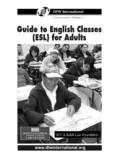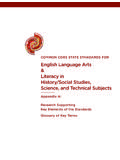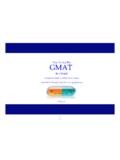Transcription of Guide to Scholarships for New Americans and …
1 Guide to Scholarships for New Americans and Minorities 1. Education is the most powerful weapon which we can use to change the world.. Nelson Mandela We at DFW International community Alliance recognize the significant role education has played in our nation's ANNE MARIE growth and success as well as in the ability of its WEISS ARMUSH. PRESIDENT AND inhabitants to pursue their right to happiness. For FOUNDER. several years we have offered this Scholarship Guide as a downloadable database for minority students and for children of New Americans who may not be aware of the many opportunities for Scholarships available to them. Over 44% of North Texas residents are immigrants and their children. Their impact in our cultural, economic and political well-being must be recognized and supported. As they continue to assimilate, their hopes and dreams become the story of our country to the rest of the world.
2 This Guide is a small symbol of our gratitude to them and to the dedicated educators who wish to assist them to reach their personal and economic goals. Anne Marie Weiss-Armush President DFW International Community Alliance 2. Our MISSION is to build mutual understanding and respect by linking diverse international cultural communities. Nuestra MISION es construir lazos que creen un mutuo respeto y entendimiento entre las diversas comunidades internacionales que viven en el norte de Texas. Guide to Scholarships for New Americans and Minorities DFW International Community Alliance 12830 Hillcrest Rd., Suite D 218. Dallas, TX 75230. 972-661-2764. Copyright 2011 All rights reserved This Guide may also be downloaded from our website. 3. INDEX. Part 1: Preparing for College College prep timeline for high school College prep Tests for College Part 2: How to Enroll in College Selecting a school .
3 9. Types of College Part 3: Financial Aid Other Informational Part 4: Directory of Scholarships for International Part 5: Para los padres Alistandose para la Como matricularse en la La ayuda We are grateful for the continued support of Ernst & Young and to the many local colleges, organizations and individuals that provided essential materials. The 2011 Scholarship Guide was updated and produced by DFW International Community Alliance's Director of Educational Programs Yamilec Calvario and interns Kayla Currie, Sohye Yang and volunteer Eva Calvario. Photographs were provided by the University of North Texas Dallas Campus, DFW International interns, Ronald Scott of Beholding Eyes Photography, Rabia Khan, Luis Lara and Jay Torres. 4. Part I. Preparing for College COLLEGE PREP TIMELINE for HIGH school STUDENTS. Excerpted from: The Sallie Mae Fund Mission: Possible!
4 Freshman Year Meet with the guidance counselor and select courses that meet college admissions requirements Take challenging classes that build skills Get involved in extracurricular activities Research career possibilities During the summer read books, take courses or volunteer Sophomore Year Some schools offer an optional PSAT and/or PLAN test to discover your strengths and weaknesses Talk to your counselor about your PSAT and/or PLAN scores and next steps Continue to research college and career options During the summer read books, take courses, or volunteer Junior year Take the PSAT. A good score may qualify you for scholarship programs. Talk to your counselor about your PSAT scores, learn how to improve them Start researching your options for grants, Scholarships , and work-study 5. Research, and visit colleges that you are interested in (and disuss them with your counselor).
5 Register for the ACT, SAT, and/or SAT Subject Tests as required by your selected colleges. Or if you haven't selected colleges, discuss with your counselor which test(s) you should take. If you can not cover the cost of the exams, speak to your counselor. Senior Year Obtain and complete admissions and financial aid applications Ask your teachers for recommendations, if the colleges require them Visit colleges and attend college fairs Send your transcript and test scores to your selected colleges Complete the FAFSA as soon as possible after January 1st Review your Student Aid Report (SAR), acceptances, and financial aid offers. By May 1st, make final decisions and notify schools COLLEGE PREP CURRICULUM. Excerpted from: ACE American Council of Education College admission officers see your course schedule as the outline of your high school education.
6 Take at least five solid academic classes every semester, including the following: English - Four or more years (grammar, composition, literature, etc. Mathematics - Three or more years (Algebra I and higher does not include general math, business math, or consumer math). Natural Sciences - Three or more years (biology, chemistry, physics, etc.). Social Sciences - Three or more years (history, economics, geography, civics, psychology, etc.). Additional Courses - Some colleges and universities require other classes such as a foreign language, theater, music, computer science, etc. OTHER ELEMENTS THAT HELP YOU SUCCEED. Excerpted from: College Board Connect to College Success Advanced Placement Program (AP) - These exams offer the credit or ad- vanced standing at most of the nation's colleges and universities. If you do well, you can save time and money while learning.)
7 Extra-curricular activities - One can join different clubs in schools to get in- volved in various activities, and also become a volunteer. Work experience - Year-round or summer internship (paid or unpaid) can help you identify career interests and goals, and gain real work experience. Be sure to list these on your application. Be aware of your class ranking. More and more colleges and universities are considering class rank when admitting students. Some Texas universities auto- matically admit top 10 percent students of the class. 6. TESTS for COLLEGE ADMISSION. PSAT - Most students take the PSAT (Preliminary Scholastic Assessment Test). in the fall of their junior year in high school . SAT - A 3-hour exam that measures verbal and mathematical reasoning. The maximum possible score is 1600 (800 verbal and 800 mathematics). The ad- missions office in the college or university you plan to attend can tell you which portions of the SAT you might need to take.
8 ACT Assessment - A 3-hour exam covering four skill areas: English, math- ematics, reading and science reasoning. Max possible score is 36. Should you take the SAT or the ACT? The SAT & ACT are the two most widely used college entrance exams. Students take it in their junior or senior year in high school . Most colleges and universities will accept scores from either for admissions purposes. However, some schools prefer one over the other. Check your school 's requirements, to make sure. 7. 8. Part 2. How to Enroll in College Choosing which college or university you want to attend is one of the biggest decisions you will make in your life. Remember, your goal is to find the school that is right for your needs, not those of your friends and family. Consider these things: Does the school offer a good program in the field you wish to study? What are the admission requirements and can you meet them?
9 How much does it cost (tution plus housing and meals) and can you afford it? How big is the college or university? You can find the answers to these questions on the internet, at college fairs, by visiting the schools, and by contacting the admissions offices of the universities/. colleges. TYPES of COLLEGES. Excerpted from: AIE Adventures in Education Community and junior colleges generally offer two-year associate degree pro- grams. For students who decide to continue their studies in a four-year program, the course credits usually transfer to four-year colleges. Four-year colleges and universities offer bachelor's degrees in many fields of study. Many also offer graduate programs. 9. Public colleges and universities are generally less expensive than private colleges. However, the low rates are normally available only to residents of the state.
10 One can be eligible for in-state(resident) fee after 1 year. Private colleges are usually more expensive than a public university. But they often offer financial aid options that make their cost feasible. Vocational training schools are privately owned and operated schools that offer a wide variety of vocational courses that take from five months to three years to complete. COLLEGE APPLICATIONS. Remember, your application makes your first impression for you. Keep a few things in mind when filling out your application: Always apply to more than one school . It is always good to apply long before deadline. Check for early admission dates to save money sometimes it can be free. Answer all questions. Don't leave anything blank. Type or print your answers. Be neat. Presentation is important. Include supporting materials (letters of recommendation, examples of your work or interests).



